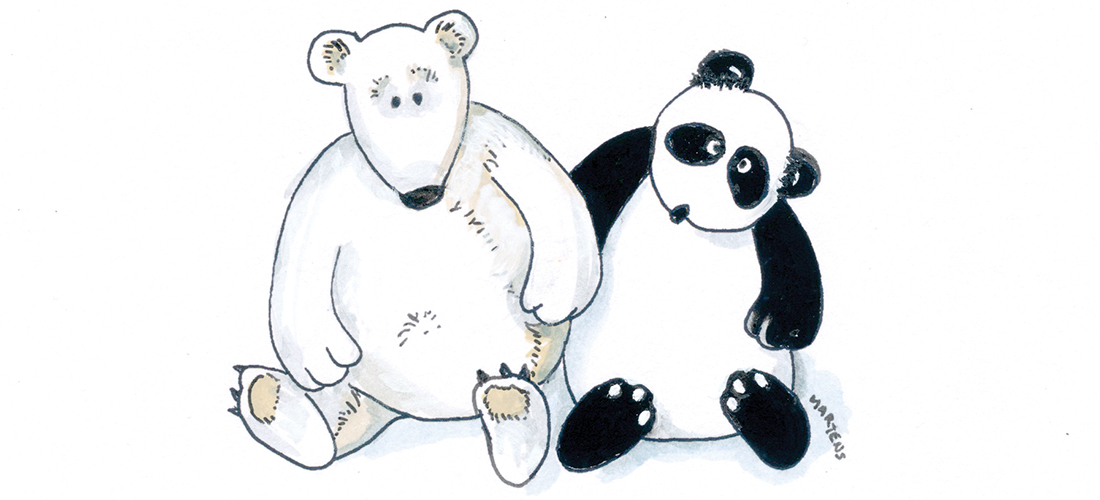
Purple Prose
A sister tells all
By Jane Borden
ìYou copied me,î Tucker said. My accuser was about 10 at the time, which would make me, her younger sister, 6. “Did not!” I shouted defiantly.
“Did too!” she said, holding her stuffed polar bear in the air as evidence. The bear’s name, Pola, was short for the word polar. I had also given my stuffed toy the name Pola. Tucker was mad.
“Did not!” I persisted. But, yeah, I’d definitely stolen her creative I.P. Because I wanted to be like her. I couldn’t reveal this motivation, though. My desire to hangdog by her side would have disincentivized her from allowing me to.
So I replied, “I thought of it because it’s short for polar, like polar bear.” A solid effort, this excuse. Surely, two people could independently have lighted upon the same abbreviation as a name. The only problem: My stuffed animal was a panda.
I did not succeed in pulling the bear hide over her eyes. And our play date ended, if you could call it play date, which I did, because even a cross-examination felt good if it was administered by her. I wanted everything Tucker had and did, usually without knowing why. Mostly, I wanted to spend time with her, and eventually I figured out how.
Tucker was a talker. Still is. She can spin anything into yarn. While your walk around the block may have just been “fine,” Tucker’s was Gulliver’s Travels. Recaps of books, movies and TV shows are her specialty. She combines an attention to detail with a strong memory and a desire to share what she’s witnessed. She’s the war reporter of cable dramas.
As a child, the tendency was especially pronounced. It’s like she aimed to record all she witnessed for the Library of Congress, and she thought I was its librarian. This worked well for me, however, because as long as I let her talk, I could spend all afternoon by her sparkling, big-kid side.
My mother, though tolerant, was not as delighted by Tucker’s tendency. She recalls driving to the beach with her once, when she was about 10 or 11. “Out of the driveway we went and Tucker said, ‘Mom, I saw this great movie.’ And my mistake was saying, ‘Oh really? What was it?’ She told the whole movie. It took the entire trip. It’s four hours to Figure Eight.”
Mom was most astonished, and still is, by her endurance. “She even did the dialogue, Jane. And then she’d say, ‘Wait I forgot something. Remember when I said such and such? Actually you need to know such and such.’ Then she’d reinsert that part into a place we’d already visited, and tell it to me again. That’s why it took four hours.” My sister Tucker, the original book-on-tape.
My mother doesn’t exaggerate. In 1985, Tucker saw The Color Purple at the Janus Theatre. It’s about a young girl named Celie, who’s married off to a much older man named Mister. The two children she’d had, by her father, are taken away from her. Celie also has a sister, and a friend who’s a singer. It’s a heartbreaking story, but the ending is happy. I remember it very well. I’ve never seen it.
It was PG-13 and I wasn’t allowed. But no matter, I got the extended, director’s-cut version from my sister. Tucker’s retelling was cinematic, longer than the original and probably longer than the book. She took me to the attic for the recap, a location, in our home on Carlisle Road, that was presumably chosen for the diminished chance of interruptions. It is also where Tucker taught me pre-algebra. Every day, she’d teach me what she’d learned that day at Aycock Middle School. So desperate was I to be with my sister that, at the age of 9, rather than jumping rope or playing clapping games, I sat in a hot attic taking pre-algebra.
You know who did play clapping games? Celie and her sister in The Color Purple. Tucker not only set the scene for me, but reenacted the pattern of the claps. She also pointed out that the flowers in the field where they played were purple — and added, “You know, like the title.” The film may have been subtle with imagery and metaphor, but Tucker was not.
The film has an oft-repeated line, “The more things change, the more they stay the same.” Every time Tucker quoted it anew, she pointed out the repetition, lest I miss the significance. Usually, I had already recognized it, but I didn’t dare interrupt. At the end, she told me about Celie’s reunion with her children, and especially that Celie wore a purple dress, “Like the title.” She told me that Mister watched from across the field, and that orchestrating the reunion was the one nice thing he ever did, and how this proved that people can change. I wept.
This was the power of Tucker’s storytelling on an 8-year-old: sobbing tears. She also told me Flowers for Algernon, when she read it, and I cried at the end of that marathon recap too. If we’d lived a thousand years ago, she’d have been in charge of the tribe’s oral traditions, telling them about the Sun God, and then turning to the sky to say, “You know, like the sun.”
Tucker’s version of The Color Purple ended as the film did, with the final scene of Celie and her sister playing the clapping game again, but as adults. Then, of course, she pointed out that it was the same game they’d played as children. But this time, Tucker was wise to hammer home the significance, considering it had now been several hours since the beginning of the film.
Before writing this article, I pulled up the movie on Netflix, to help me recall some of the details and to fact-check my blurry memory. I only watched a few scenes, most of which were unfamiliar. But I need you to know that the shot of Mister at the end — in his wide-brimmed hat, standing next to his horse, witnessing Celie’s reunion with her children — is exactly as I’d remembered it, in spite of the image never before meeting my eyes. This means that Tucker even described the shape of his hat. I’m surprised she didn’t also recount the rolling credits: “The Boom Operator was Marvin Lewis. Ooh, and the Foley Artist . . .”
“I ruined it for you!” she shouted in apology when I called her this week. “I’m so sorry.”
“You didn’t ruin it. I loved it,” I said. “You told me good stories!”
This is true. However, today, when I talk to Tucker, I choose when to say, “Tell me more,” and when to quickly change the subject. Because the more things change, the more they stay the same. That’s the same adage from the film. Just making sure you didn’t miss it. OH
Jane Borden lives in Los Angeles with her husband, daughter and her daughter’s stuffed rabbit named Pola.





